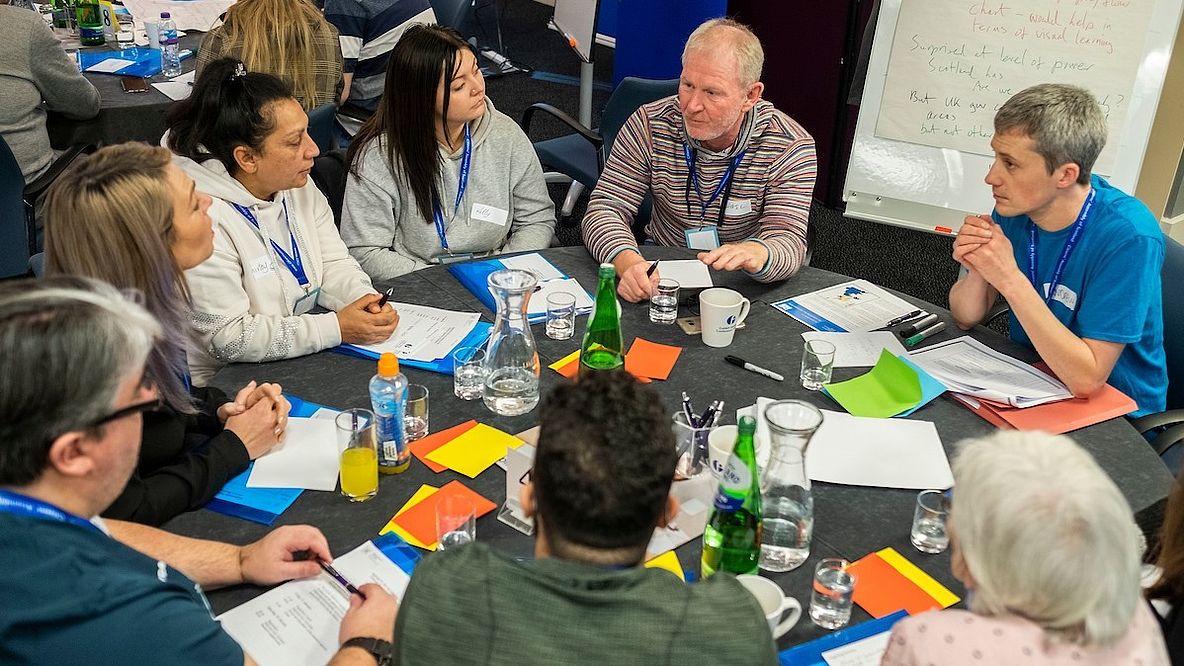Citizens' assembly recommends citizens' assemblies

There should be more sortition in Scotland. This is what the Citizens' Assembly on the Future of Scotland recommends in its citizens' report published on 13 January 2021. The participants randomly selected from all walks of life in Scotland for the Citizens Assembly of Scotland recommend, among other things, the holding of more citizens' assemblies and the establishment of a randomly selected parliamentary chamber.
Future citizens' assemblies should be used to gather people's views and ideas on issues important to the country, the report says. There should be an independent body to make the decision on when and on what topics when politicians cannot come to agreement, and to ensure accountability for follow up.
Citizens' assemblies to scrutinise legislation
Citizens' assemblies should be able to review existing legislation in key areas and propose simplifications or reviewing. The government and parliament should work with mini assemblies on issues that affect everyone, including all under-represented groups. These should be called at the start of each parliamentary session and be set up to examine specific issues. Their recommendations must be debated in Parliament before the assemblies are disbanded.
The country's first citizens' assembly also calls on the government and parliament to set up a ‘house of citizens’ to scrutinise government proposals and give assent to parliamentary bills. Membership should be time-limited and representative of the population of Scotland, similar to the way this Citizens Assembly of Scotland was selected. There should be an oversight body to ensure this.
Citizens' Committee in the Parliament
The government and parliament ar called to set up a citizens' committee in Scottish Parliament. This would be a randomly selected body, with members being encouraged and supported to take part. It would offer advice and opinions on government proposals, review the work of parliament and hold the government to account. It would be for a fixed term with members receiving a gift of thanks.
Last but not least, the Citizens' Assembly recommends to establish community-based citizens' assemblies to assess what is happening in the communities, identify gaps and recommend actions, including through digital technology, that can bring people together and make the communities more inclusive.
100 randomly selected citizens
The Citizens' Assembly of Scotland was an assembly of 100 citizens from across Scotland. The Citizens' Assembly was composed according to the rules of stratified sampling so that it was broadly representative of the adult population (16 and over) in terms of age, gender, socio-economic class/educational qualifications, ethnic group, geography and political attitudes. The Assembly had met four times in face-to-face meetings and four times online due to the Corona pandemic to deliberate and make recommendations on the future development of Scotland. To this end, the participants had listened to a number of experts and discussed the individual topics together.
In addition to citizens' assemblies, the recommendations also cover global trade, the economy, democracy, immigration, taxation, education, minimum wage, poverty, health, energy supply, digital infrastructure, young people and the environment.
Government response
On 23 November 2021, the Scottish Government had responded to the recommendations of the Citizens' Assembly. Its response states, among other things: "The government is committed to promoting citizens' assemblies and other forms of deliberative democracy - such as citizen juries, mini-publics and people's panels - to bring people together to generate new ideas; add fairness, equality and credibility to the policy making process; and improve trust between government and the people it serves."
A second Citizens' Assembly has taken place with the Scottish Climate Assembly, whose citizens' report was presented to the Scottish Parliament on 23 June 2021. The government had also set out its plans for further use of citizens' assemblies, including an assembly for children under 16. There will also be a citizens' assembly to fund local government, including Council Tax.
Commitment to increased use of of deliberative engagement
"The Scottish Government and Scottish Green Party shared policy programme also sets out a commitment to increased use of deliberative engagement, development of support for effective citizens' assemblies, and deliberative engagement on funding local government, starting locally and culminating in the national citizens' assembly", the government writes.
Later this year, an expert group is announced to report to Ministers on institutionalising inclusive participatory democracy across Scotland's democratic processes, including future governance and question setting for citizens' assemblies.
Consideration with key stakeholders
"Other recommendations from the Assembly on a house of citizens and a citizens' committee go to the heart of how parliamentary democracy in Scotland operates. They engage the interests of all political parties, civic Scotland and the Scottish Parliament at an institutional level. Consideration is therefore needed with these key stakeholders on how to address the recommendations," the government says.
There would be a challenge in incorporating a representative selection of the public directly into existing government and Parliamentary institutions which are based on representative democracy, elected at regular intervals. "The Scottish Government plans to engage with the Scottish Parliament on the best way to take these forward".
Engage with the parliament
Similar considerations apply to the recommendations that concern the conduct and integrity of politicians and the responsibilities of MSPs to their constituents, as well as the appointment of a non-political independent review body. "Again the Scottish Government plans to engage with the Scottish Parliament on the best way to take these forward," the government announces.
Read more: